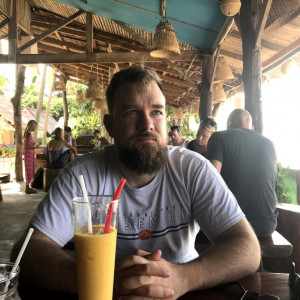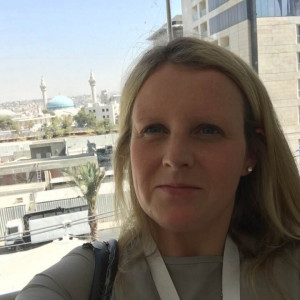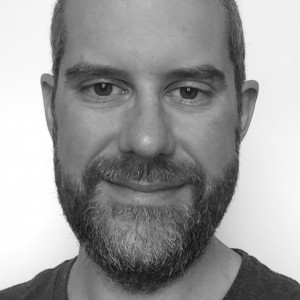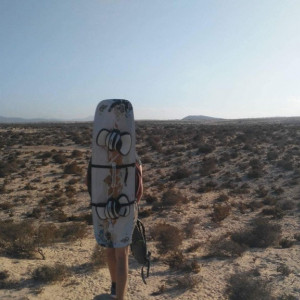What tools do you use to stay productive?
Interview with Jake, a customer success manager for Atlassian
Trello for daily tasks and long-term goals. Slack, of course... all day, every day. Confluence for documentation and note-taking/information sharing. BearApp for personal notes. CloudApp for sharing screenshots. I also use Gmail and Google Calendar.
Jake was burned out on the San Francisco lifestyle—see how he transitioned from working in-office to working remotely for a remote-friendly company.
Read full interview from Interview with Jake, a customer success manager for Atlassian.
Interview with Ascencia, a content marketer, and avid gig economy professional
For note-taking, I use Evernote. I take notes there when I read books, take an online course, or just brainstorm for work.
To be honest, the most motivating tool for me is the Upwork time tracker. I work on an hourly basis, so it’s important to track time and keep the tracker on the whole time I’m working. It would capture my screen every 10 minutes.
Out of various project management tools I’ve tried, I like Asana the most.
A forgotten two-year-old Upwork account allowed Ascencia to become a content marketer—see how the gig economy has offered her an alternative path to success.
Read full interview from Interview with Ascencia, a content marketer, and avid gig economy professional.
Interview with Molood, a CEO who shares how minimalism has improved her remote work experience
I get this question a lot. The truth is all I use is a calendar, a task management system, chat, and email. I do not believe that any combination of tools has the ability to make me more productive.
My own habits and the way I manage my time and space are what really make an impact on my productivity. Hiring a virtual assistant has been instrumental for staying on top of all the tasks I need to accomplish. And self-discipline has been another.
I can list the tools that have made it easier for me to stay productive and, in particular, those that have made my online meetings more professional no matter where in the world I conduct them from:
Hardware:
- Logitech webcam (for a high-quality video anywhere)
- Blue Snowflake microphone (portable microphone for a high-quality voice anywhere)
- Airpod pro (has great noise canceling in any environment)
- Clip-on ring light (to always have good lighting)
Software:
- Krisp noise-canceling microphone to cancel the noise of the environment for the person/people on the other side of the call
- Appointment booking that checks for all collisions in all calendars (I use Calendly)
- Zoom, Google Meet, etc. (I am not tool dependent for video calls)
As CEO and Founder of Remote Forever, Molood has made a career in teaching individuals and companies how to work remotely effectively. See how embracing a minimalist lifestyle has caused her to excel.
Read full interview from Interview with Molood, a CEO who shares how minimalism has improved her remote work experience.
Interview with Artur, an engineer who found purpose as an Intrapreneur
This list is in no particular order:
- Alfred for running everything on my laptop, with a full suite of custom workflows
- Trello for task management
- Grammarly for checking my writing
- Brain.fm for ambient noise and focus music
- Bose QC25 for noisy work environments
- PHPStorm for coding PHP & JavaScript, and Sublime for everything else
I use a MacBook Pro 13'' that I hook up to an external monitor at home and at WeWork. I have switched the keys in the laptop and the two magic keyboards to Colemak layout. I started having carpal tunnel symptoms, and this arrangement helped a lot.
I am also an Evernote junkie. A lot of my thinking happens there, and I have developed a set of custom tools. For example, every day I receive a journal entry created from a template that helps me start the day with the right questions.
I also try—and fail— to write a summary of every book I read. Every week, I get a book to review, and knowing that I have to write up notes makes me more mindful during the reading.
Artur realized entrepreneurship wasn't for him—see how he carves out his creativity and purpose as a remote Intrapreneur at Automattic.
Read full interview from Interview with Artur, an engineer who found purpose as an Intrapreneur.
Interview with Meryl, a digital marketer and master of home office organization
Once you go to two monitors, you won't go back to one! I use email, document and spreadsheet apps, and a task management app that syncs tasks between the desktop and cell phone. I also use a phone and tripod for creating videos and YouTube to add captions.
Meryl K. Evans is skilled at creating a home office that leads to remote work flexibility. See her advice for creating a successful workspace, and hear about her journey into freelancing.
Read full interview from Interview with Meryl, a digital marketer and master of home office organization.
Interview with Nathan and Connor, owners of Freeeup
Skype, Viber, and Zoom for live chats, phone calls, and video meetings. Trello, Jira, and Notes for project management. Calendly and Google Calendar for scheduling appointments and meetings.
We’ve been working together for 8+ years, so we’ve really figured out the best ways to keep communication strong between ourselves and our entire team even though we’re all located around the world. For us, communication is everything.
Thinking of creating your own remote startup? See how Nathan and Connor built a successful and effective remote team from scratch.
Read full interview from Interview with Nathan and Connor, owners of Freeeup.
Interview with Maggie, a senior product manager at HubSpot
Slack and Zoom mostly. We also use Jira to track work. I’m also a huge fan of Trello.
I use Zoom for face to face meetings with my team, and I use Slack to chat with my teams and other individuals throughout the day. We are quite low on email usage and chat live on Slack for the most part.
We also use Jira to manage our engineering work. Finally, I have used Trello for everything from managing lists in my personal life, to executing major projects.
Remote work allows Maggie to live in a small town and excel in her career. Hear about how she stays professionally connected, and her essential career advice for remote workers.
Read full interview from Interview with Maggie, a senior product manager at HubSpot.
Interview with Ben, a web developer who freelances from home
Headphones. #1 with a bold and underline. I have significant other, and live in a semi-loud neighborhood, but even when it's almost silent, putting them on helps me focus. They're partially noise cancelling, so that extra quiet can help.
Netflix, Spotify, YouTube, other media.
I've found over the years that having media on in the background is usually helpful to getting me in the flow.
I've had a second screen on my computer for a very long time, and there's almost always something playing on it (usually shows or movies I've already watched, so I don't really pay more than 10% of my attention to them). The only time I don't is when I'm on a Skype call with someone, when I'm planning a project, or when I'm stuck on a difficult problem.
Screens. For the longest time I've had pair of standard 1080p 24" monitors (Dell Professional series, because they're one of the few monitors that have a vertical stand that slides up and down). Late last year I was able to upgrade to a 4k 27" panel, and it was the best piece of hardware I've gotten in a long time. I'm able to see way more code on the screen, see 2 full 1080 width browsers side by side, and just, more. The extra real-estate on one panel is well worth the cost of the monitor.
Desk lamp. Seriously, this one sounds dumb, but when the room gets dark enough that I can't see things properly, that little desk lamp balances it out so well. I have one that clips to the edge of my desk, and it's behind my monitor, so my keyboard is lit indirectly, and I don't get eyestrain.
Multiple CPU cores, and a good chunk of RAM. Having a beefy desktop means I can spin up small virtual machines to run test servers on, to run clean desktops for test environments, to partition off different clients environments.
It's a huge time save to just be able to close a VM, have it save state, then just boot up the next week with all the stuff you were working on exactly where you left off.
Notepad, note pad, boogie board, scrap paper. I use all of these things to take notes when I'm in the middle of something, or when someone asks me for a new feature or a tweak while we're reviewing a project, or just as a paste dump for thoughts in progress. I sometimes dump it to digital notes, sometimes to paper (which eventually goes to digital notes or tickets). There's something really good about being able to write out an idea on paper or board that makes it easy to see the whole picture. Which I grab varies from day to day, even minute to minute, but whatever feels best is what I use.
Learn the tips and tricks Ben uses to stay productive while working remotely on a hybrid team
Read full interview from Interview with Ben, a web developer who freelances from home.
Interview with Harry, an IT Architect who works from home
My 13" Macbook Pro is my workhorse. I like the size as it's small enough to remain portable and still have enough juice to run my multitasking universe.
My iPhone keeps me connected while I'm on the go—I'm constantly tethering my laptop to it while mobile. My 100 Mbs connection keeps me wired at home.
Email and Cisco Jabber for keeping in touch with coworkers and Citrix for connecting to the office in NYC.
Harry has worked remotely for almost 10 years as a senior mobile, web and desktop developer—learn how he balances work with family.
Read full interview from Interview with Harry, an IT Architect who works from home.
Interview with Patryk, a Front-end Developer & UI Designer
Memo notes. 📝 Seriously.
I tried out dozens of shiny apps and read hundreds of articles on productivity. And this old school item is the simplest and the most powerful solution.
Each evening, I write down up to 3 tasks I want to accomplish. The key idea is focusing on what's the most important right now. The next day, I don't need to prioritize.
Patryk has learned that there is no reason to wait for the flow - once you start working, it will happen naturally.
Read full interview from Interview with Patryk, a Front-end Developer & UI Designer.








